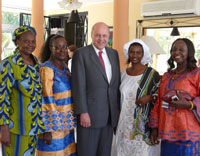| |  The Community of Democracies“Never before have we been so unified in charting a course of better opportunity for all men, women and children of the world. The whole world stands to benefit from the stability that will come from a future of development and democracy.”
- John D. Negroponte, Deputy Secretary of State,
Speaking at the inaugural ceremony of the 4th Community of
Democracies Ministerial, Bamako, Mali, November 15, 2007

Deputy Secretary Negroponte at society lunch in Bamako, Mali. |
Deputy Secretary of State John D. Negroponte led the United States' delegation to the fourth ministerial meeting of the Community of Democracies, delivering remarks at the inaugural ceremony on November 15, 2007, in Bamako, Mali. The United States is a strong supporter of the Community of Democracies (CD), a unique forum that brings together those nations committed to promoting and strengthening democracy worldwide. The Community is the only global forum singularly dedicated to the promotion of democracy.
Well over 120 nations have come together – first in Warsaw, Poland, in 2000; then in Seoul, South Korea, in 2002; for a third time in Santiago, Chile in 2005; and most recently in Bamako, Mali, in 2007 – to reaffirm their commitment to consolidate their own democratic institutions and work with other countries regionally and globally to help them on their path of democratization. The basic principles of the group are enshrined in the Warsaw Declaration; its blueprint for action is captured in the Seoul Plan of Action. The criteria for CD participation were also established by the Convening Group, the 16-member group of governments that provides leadership to the CD, in Seoul. The 2005 Santiago Commitment advanced the Community’s agenda by strengthening regional and inter-regional cooperation for democracy promotion, as well as global efforts, through support for the UN Democracy Fund and the UN Democracy Caucus.
On October 1, 2007, on the margins of the UN General Assembly, Mali hosted a short meeting of Ministers that set the stage for the November ministerial meeting in Bamako, Mali. Secretary Rice’s remarks at the meeting outlined U.S. priorities for the Ministerial, and highlighted Mali’s $460-million Millennium Challenge Corporation Compact, the Organization of African States-African Union Democracy Bridge, the UN Democracy Fund, the Asia-Pacific Democracy Partnership, and the importance of CD engagement in international fora. At the recent Bamako Ministerial, the Community focused on encouraging democratic governance as an essential element to sustainable development and alleviation of poverty.
Selection Process: Who Participates?
For the first time, in preparation for the Ministerial in Bamako, the non-governmental process of the CD formed an International Advisory Committee of experts and eminent persons. This committee developed and presented to the Convening Group formal recommendations for invitations to the Bamako Ministerial based upon the CD criteria for participation. The Convening Group used the recommendations as key input in their process for determining the invitation lists for both Participants and Observers to the 2007 Ministerial. Ultimately, 125 nations were invited as full Participants, and a further 20 countries were invited to participate as Observers. As in previous CD ministerial meetings, non-governmental organization (NGO) representatives played an essential role, particularly during the thematic and regional discussions. More than 100 NGO representatives attended.
Action: What does the CD do?
Since expressing their support for the Seoul Plan of Action, many countries have stepped forward to implement the Plan of Action. The Chilean Government issued a report in September 2004 outlining many of these steps. In May 2004, the U.S. and Portuguese Governments jointly led a mission to East Timor focused on rule of law that supported the development of a professional and independent judiciary. The Romanian Government led a similar mission in February 2005 to Tblisi, Georgia. In November 2003, the Romanian Government also hosted a regional conference for governmental and non-governmental representatives from Eastern Europe in Bucharest to discuss regional democracy promotion. Other examples of Community initiatives include the June 2003 Dialogue on Democracy in Washington, DC, in which leaders from Latin America and Africa shared best practices and discussed follow-on initiatives related to democracy promotion.
At the Santiago Ministerial, the Convening Group agreed to form four working groups with the task of developing democracy promotion initiatives. Under Malian leadership, the following working groups were created: Civil Society and Democratic Governance; Poverty and Democracy; Regional and Inter-regional Cooperation for Democracy; and Threats to Democracy. Working groups are composed of CD members and NGOs and serve to put into action the CD commitments. Each working group made progress reports to the Convening Group, which were made available at the Bamako Ministerial Conference. A notable accomplishment of Mali’s chairmanship was the agreement to establish a CD Permanent Secretariat. The Secretariat, which will be hosted by the Government of Poland, will help the CD coordinate its democracy promotion and human rights work. In June 2008, Polish Professor Bronislaw Misztal was confirmed by the CD Convening Group as the Executive Director of the Permanent Secretariat.
The Bamako Ministerial Conference
The theme of the Bamako meeting was “Democracy and Development.” Ministers and senior officials met to discuss key thematic concerns, including:
- Developing democracy caucuses at the UN and other regional organizations;
- Poverty, development and democracy;
- Regional and inter-regional cooperation for democracy;
- Civil society; and
- Regional organizations' efforts to combat threats to democracy .
In addition, participants met as regional groups to grapple with the challenges facing each region and identify innovative ways democracies can share best practices and pursue joint activities. | |
